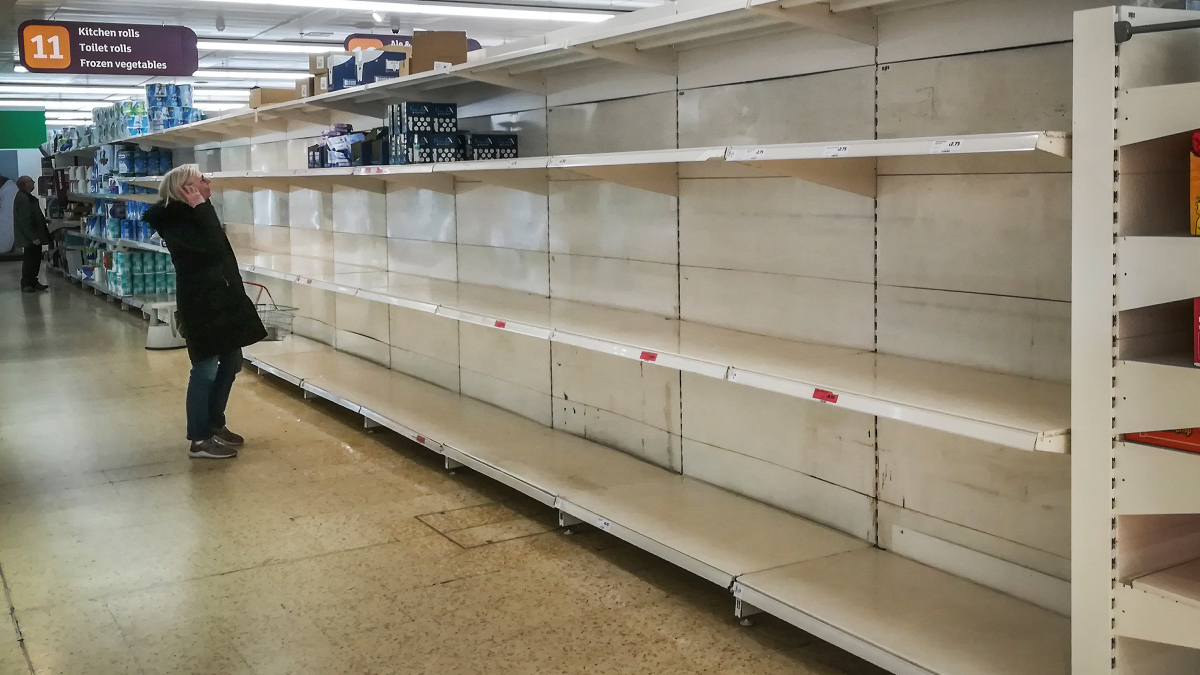British author Oliver Murphy talks about stockpiling and the reasons behind panic buying.
It was last week when Isabel had come out of major surgery to remove a brain tumour. Now convalescing at home, Isabel (not her real name) is only able to take paracetamol to manage what she describes as “excruciating pain”. But since coming home, she has been unable to purchase any painkillers—and she’s visited every supermarket in her town. Isabel is now having to manage the pain with no medication. “I’ve tried for three days in a row, and nothing” she tells me over the phone.
Isabel is not alone in her ordeal. Donna is the daughter of an elderly parent and grandparent. Both suffer from Protein S deficiency, a disorder which results in an increased risk of blood clots. They require daily doses of the blood thinning medication, Warfarin. Donna tells me that the only medication her relatives are able to use to ease their pain is paracetamol. While Aspirin seems to be readily available, they are unable to take it as it also thins the blood. “The complete lack of basic painkillers in nearly every shop is worrying, my grandfather has dementia so it is really important to keep my mother healthy so she can look after him.”
“Massively inflated prices”
So why the shortage? For days on end, large swathes of the British public have literally emptied supermarket shelves of a variety of products in a spate of panic-buying sparked by the rising concerns of coronavirus. With everyday staples such as toilet roll, pasta and basic pain killing medication virtually disappearing, resources are scarce.

As is happening here and Australia.
[…]Crucially, they are also at risk of an ever-worsening ideology which thrives in times of crisis: individualism. It’s the ideology that fuels our society, with a focus on the wellbeing of ourselves. It’s a political philosophy which places an immense amount of value on one’s desires, and the idea that the interest of the individual should prevail over that of any other group. It turns mankind against itself.
Unfortunately the only thing the author gets right in the last paragraph is that individualism is about self-interest. Not selfishness, self-interest. The reasoning behind this is that when it comes to making decisions, in general, it is the individual who is best at making the decision when it directly affects himself, and not the State.
We feel unconnected to other people
Ever since the premiership of Thatcher, the UK has fostered the conditions necessary to ensure the supremacy of the individual. Be it through privatisation or cuts to income tax, individualism has been encouraged in the belief that it will lead to the betterment of society as a whole. But this is a flawed narrative. As British Economist William Forster Lloyd first argued when he coined the term “tragedy of the commons”, in a society where resources are shared, individuals prioritising their own self-interest can deprive others.
Here we’re talking selfishness, not individualism. It’s the same kind of argument used against Libertarianism by those who say a Libertarian wouldn’t save a drowning child. The answer is, of course, we would try to save the child if by our inaction we would cause harm to others.
This is true of Britain’s response to coronavirus. Just as individualism dictates, in the face of the outbreak, people have begun to act in a way that advances their own interests. They focus on protecting themselves and their families while ensuring they have enough resources to ride out the pandemic. While on the surface there is nothing wrong with looking out for ourselves—after all, self-preservation is supposedly an instinct—in doing so people have depleted supermarkets of essential items, harming those less able to engage in the hysteria of panic-buying.
But perhaps the most concerning aspect, is the seeming lack of a common future. Ken Tucker, Professor of Sociology at Mount Holyoke College in Massachusetts, says that while individuals are responsible for themselves, many people now also view their life through an individualistic lens with no connection to other people. So when some kind of unexpected disaster hits, it is not surprising that people engage in panic buying and only look out for themselves, for that is both the real world situation they live in and how they see the world.
This to me is the most important bit of the whole article. The key to happiness is not money although it certainly helps. The key to happiness is the connections we have to others. Excepting those who are trying to profit (greed), those who panic buy do so because they lack connections with others. Those who have connections with others know that if they run out of something they need they can ask their neighbour for help. And if their neighbour runs out of something they are more than willing to help their neighbour.
[…]Hope on the horizon
But in spite of this pervasiveness of individualism is being challenged. While the scenes of panicked consumers have created the impression that the entire population is only looking out for itself, tens of thousands of people in the UK have come together to establish mutual aid groups. Designed to help neighbours in self-isolation, more than 720 groups have been set up to deal with vulnerable cases, a sign that in the face of growing individualism, there is a sense of community still left.
Which I have every confidence will happen here too, if it hasn’t happened already.
The key word here is proportion. There is nothing wrong with practical precautions. But as the coronavirus poses the biggest challenge to the population, what we need is a humanistic approach, one that recognises both the importance of fostering the individual and necessity of minding the interests of the collective.
In any crisis, the first priority is to ensure that you are safe and have what you need. It doesn’t mean hoarding and panic buying. Then it becomes our moral and civic duty to give help to others where we can. The alternative is a society where, as the author implies, if you don’t screw over your neighbour, he will screw you over.

